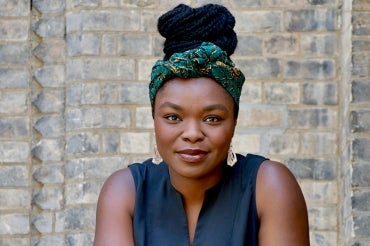Creative Writing Workshop for Racialized Students lets participants 'showcase the beauty of my background'

Published: February 24, 2023
Having completed most of her degree online due to the COVID-19 pandemic, Calista Nyembwe was looking for a way to connect with other students and to express herself.
“I’m constantly writing academic papers for school and I needed an outlet to be creative again,” says Nyembwe, a fourth-year student in the University of Toronto’s Faculty of Arts & Science who is majoring in diaspora and transnational studies and minoring in African and Caribbean studies as a member of New College.
“I wanted to write about experiences that I can relate to. I wanted to write stories about the subjects I’m studying, but I also wanted to get into more personal writing because it can be a great way to get my thoughts and feelings out.”
She found exactly what she was looking for with the Creative Writing Workshop for Racialized Students, which ran through January and February of this year.
Sponsored by the African Studies program and co-sponsored by African Studies Course Union (ASCU), the workshop was created by Comfort Azubuko-Udah, an assistant professor in the Faculty of Arts & Science’s department of English who is cross-appointed to New College’s African Studies program.
The four-session workshop offered students a welcoming space to be expressive, creative and vulnerable in personal storytelling – no grades, no expectations, no pressure.
“I just wanted to encourage students to tell their own stories in their own voice and not have to worry about having this air of expertise,” says Azubuko-Udah.
“The idea was to be able to own your experiences and not have to explain yourself or feel the need to have your experiences mediated for someone else's consumption.”
She created the workshop, in part, because she, too, wanted to connect with students after arriving at U of T last summer.
The workshop attracted 17 students from different genders, cultures and academic programs.
“Interestingly, I had quite a few STEM students,” says Azubuko-Udah. “I had some students in the humanities and social sciences as well. I even had a York University student who commuted to join us.”
One of the STEM students was Anaïs Ouedraogo, a third-year cognitive science and global health student and a member of University College.
“Being on a campus as large as St. George and in two STEM programs, I rarely have the chance to sit back and reflect on my identity and experiences in a space with people who look like me,” says Ouedraogo.
“Because I struggle with expressing a lot of what I feel and my lived experiences, this workshop was the perfect opportunity to learn a new way of creative expression. I want to write about the lived experiences of trauma and pain that I’ve been struggling to accept throughout my life.”
The workshops were a mixture of reading, writing exercises and discussion. One of the early exercises involved simply learning how to pronounce everyone’s name correctly.
“We went around the room and I made a point of having them all say their names and write them out,” says Azubuko-Udah. “And then we talked about our names – if there was meaning behind them and how we came to get that name. It was a way of being able to just exist and not have to constantly negotiate.”
That theme of not having to negotiate extended to being encouraged to write in multiple languages “if that proved easier and more reflective of who they are, and not have their stories or experiences ‘watered down’ through translation," says Azubuko-Udah.
Azubuko-Udah says she designed the workshop to focus on the joy of writing and storytelling, regardless of the subject.
“Literally everywhere else, they're hyper-aware of their race and racialization and dealing with microaggressions and macroaggressions on a daily basis,” she says. “In this space, we definitely had people share stories about questionable things they've experienced.
“A racialized positionality can come to define one's whole being and everyone was welcome to resist that expectation if they wished, or dive into it as they saw fit. But I wanted them to feel like they have a right to frivolity when it comes to their storytelling.”
The approach clicked with Nyembwe. “I would say a huge block in my writing these past couple of years has been the lack of just writing for fun,” she says.
Regardless of whether the stories were serious or light-hearted, Azubuko-Udah says she witnessed a change in the students.
“I got a lot of joy out of seeing them gain the courage to share something they've written with the group, allowing them the space to share in ways they've not usually felt comfortable sharing in bigger spaces,” she says.
Azubuko-Udah is open to hosting another workshop with a longer duration. In the meantime, the four-week workshop has made a lasting impact.
“This workshop will help me with writing in school or outside of school because I thrive when I’m being creative, and I work best when I don't feel restricted,” says Nyembwe. “It’s helped me revisit creativity and think of ways of applying this to academic papers.”
“I’ve learned to be more honest with myself through writing,” says Ouedraogo. “Now, I feel like I can clearly express myself and showcase the beauty of my background thanks to Comfort’s workshop.”



